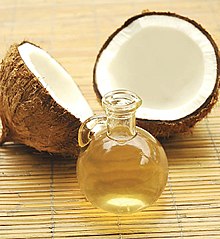 | |
Coconut oil (or coconut fat) is an edible oil derived from the kernels, meat, and milk of the coconut palm fruit.[1] Coconut oil is a white solid fat below around 25 °C (77 °F), and a clear thin liquid oil at higher temperatures. Unrefined varieties have a distinct coconut aroma.[2] Coconut oil is used as a food oil, and in industrial applications for cosmetics and detergent production.[1][2] The oil is rich in medium-chain fatty acids.[3]
Due to its high levels of saturated fat, numerous health authorities recommend limiting its consumption as a food.[2][4][5]
Coconut oil is widely used for cooking and baking due to its high smoke point and distinct flavor.
- ^ a b "Coconut oil". Transport Information Service, German Insurance Association, Berlin. 2015.
- ^ a b c "Coconut Oil". The Nutrition Source, Harvard T.H. Chan School of Public Health, Boston. 2021.
- ^ Marina, A. M.; Che Man, Y. B.; Amin, I. (1 October 2009). "Virgin coconut oil: emerging functional food oil". Trends in Food Science & Technology. 20 (10): 481–487. doi:10.1016/j.tifs.2009.06.003. ISSN 0924-2244.
- ^ Sacks, Frank M.; Lichtenstein, Alice H.; Wu, Jason H.Y.; Appel, Lawrence J.; Creager, Mark A.; Kris-Etherton, Penny M.; Miller, Michael; Rimm, Eric B.; Rudel, Lawrence L.; Robinson, Jennifer G.; Stone, Neil J.; Van Horn, Linda V. (2017). "Dietary Fats and Cardiovascular Disease: A Presidential Advisory from the American Heart Association" (PDF). Circulation. 136 (3): e1–e23. doi:10.1161/CIR.0000000000000510. PMID 28620111. S2CID 367602.
- ^ "Coconut oil 'as unhealthy as beef fat and butter'". BBC News. 16 June 2017. Retrieved 18 June 2017.